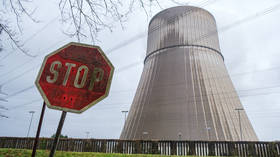Germany ditching nuclear power at worst possible time

Germany is on track to close nearly half of its nuclear reactors before the end of 2021. The shutdowns are set to place a huge burden on European power grids in the face of one of the worst energy crises ever.
As part of the nation’s nuclear phaseout, Berlin will shut down its Grohnde, Gundremmingen C, and Brokdorf plants, leaving only three reactors that will also be taken offline by the end of next year.
In 2011, the German authorities ordered the immediate shutdown of eight of its 17 reactors in the wake of the Fukushima disaster in Japan and following years of anti-nuclear rallies. Back then, Germany pledged to phase out nuclear plants by 2022.
At the time, the country was a leader in renewables, but the policy shift made it more dependent on coal and lignite for generating electrical power. It has been left behind in the net-zero race, having made major concessions to wind-farm protesters, the coal lobby, and automakers.
The nation is projected to take all coal-fired generation offline by 2038, with lignite power plants reduced by almost 16% by 2024. According to the International Energy Agency, high carbon prices and an expansion of renewable power will have cut Germany’s coal production “strongly” by that time.
The closure of remaining nuclear reactors is expected to remove a major source of low-carbon power in a nation where emissions are on the rise. This comes on top of the latest squeeze on energy supply amid surging global demand after the initial impact of the coronavirus pandemic.
“From a pure emissions perspective, it was always a questionable idea to shut down German nuclear before the plants have reached the end of their lifetime,” said Hanns Koenig, head of commissioned projects at Aurora Energy Research, as quoted by Bloomberg.
“It was always clear that the nuclear phaseout would need coal and gas plants to run more and therefore cause substantial extra emissions.”
While the shutdowns have been known about for years and are unlikely to cause a spike in prices, the removal of four gigawatts of baseload output highlights a dwindling reserve of buffer capacity in Germany. That’s why prices for electricity for delivery in 2022 have soared more than fivefold this year.
The current power prices across Europe are at a record high, and Germany is expected to rely on costly gas and coal for another two decades, before they are phased out as well.
Growing reliance on fossil fuels will inevitably boost emissions further not only in Germany. Other European nations also had to boost coal-fired power production in recent months as gas supplies failed to meet rebounding demand and wind generation fell short.
At the same time, keeping the nuclear power plants open any longer isn’t an option, as the move would take hundreds of millions of euro in investment, according to Koenig.
For more stories on economy & finance visit RT's business section















